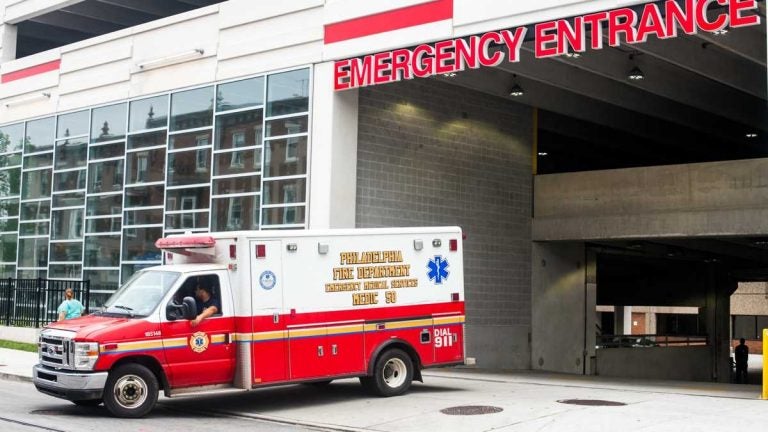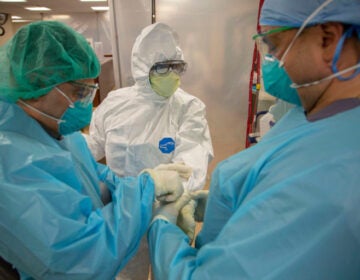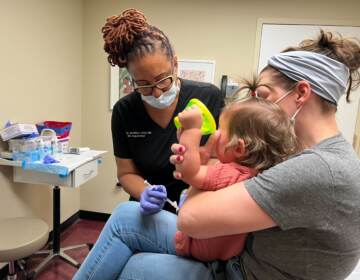Frontline health care workers seek immunity from malpractice during COVID-19
The Pennsylvania Medical Society is asking Governor Tom Wolf to grant temporary immunity from malpractice claims to healthcare workers during the coronavirus pandemic.

In this file photo, an ambulance pulls out of the emergency entrance at Temple University Hospital. (Brad Larrison for WHYY)
The Pennsylvania Medical Society is asking Governor Tom Wolf to grant temporary immunity from malpractice claims to health care workers during the coronavirus pandemic.
“We respectfully urge you to recognize the heroic dedication of all health care workers by signing an executive order granting medical liability immunity for care rendered during the time period of the COVID-19 emergency declaration,” the group wrote in a letter to Governor Wolf Tuesday.
Pennsylvania Medical Society President Lawrence John said health care workers across the state are taking on roles outside their specialty area and making quick decisions to battle a disease that still is not well-understood.
This is a very unusual and novel situation we have been put in, and we don’t have all the answers,” said John, who also practices family medicine near Pittsburgh. “We [should] not have to worry about malpractice suits while trying to save people’s lives.”
Wolf spokesperson Lyndsay Kensinger said the administration is “reviewing options to address this issue.”
The governors of New York and Illinois, states hit hard by coronavirus, have already issued executive orders limiting health care workers’ liability during the outbreak. In New Jersey, a bill providing similar protections passed out of the legislature on Monday.
Nationally, the CARES Act stimulus package, passed by Congress in March, provides some liability protections to medical professionals who volunteer their time to help fight the pandemic.
‘Not a real problem’
Some Philadelphia malpractice lawyers are skeptical that liability immunity is justified.
“Where is this concern coming from?” asked Eric Weitz, a Philadelphia personal injury attorney and Vice Chair of the Medical Malpractice section of the Pennsylvania Association for Justice, the state’s trial lawyer association.
“I watch these issues closely, and I have not seen a lot of lawyers or patients running out and filing claims arising out of…the COVID-19 pandemic.”
Weitz said he supports limited malpractice immunity for frontline health care workers during the outbreak, but he is concerned that the Pennsylvania Medical Society could be using this crisis to ultimately try and enact broader tort reform.
Personal injury attorney Chip Becker said he is worried that a broad immunity protection would ultimately hurt normal people by protecting hospitals, nursing homes, medical device makers, and other health care institutions from lawsuits meant to address poor treatment.
“My sense of all of this is that ‘immunity’ here is not a real problem,” Becker said. “And that ‘immunity for health care professionals’ is being used as a cover.”
‘Not a time for people to be timid’
For Doctor Curtis Miyamoto, malpractice concerns are a constant anxiety.
As the Chair of Radiation Oncology at Temple Health in Philadelphia, Miyamoto normally spends his time treating cancer patients. But lately, like many of his colleagues, he’s been treating people with COVID-19 symptoms as well.
“I don’t think there is a specialty that is corona-free,” Miyamoto said.
Miyamoto said, in addition, he’s asking some of the cancer patients he is seeing to delay treatment to avoid coming to a hospital and potentially getting infected — a decision he thinks is best for their health, but he worries may cause them to file a lawsuit against him down the road.
“A lot of us are being expected to do things we don’t normally do,” Miyamoto said. “[Malpractice fear] is a significant deal.”
Miyamoto said legal protection would allow him to focus completely on what matters most right now: beating back the outbreak.
“I think it’s important that everybody understands that this is not a time for people to be timid, Miyamoto said. “Right now there is something that is killing [people] in the streets, and we need to prevent that.”
WHYY is your source for fact-based, in-depth journalism and information. As a nonprofit organization, we rely on financial support from readers like you. Please give today.





![CoronavirusPandemic_1024x512[1]](https://whyy.org/wp-content/uploads/2020/03/CoronavirusPandemic_1024x5121-300x150.jpg)



